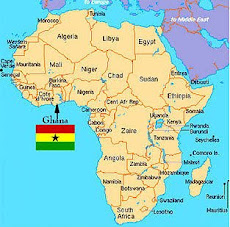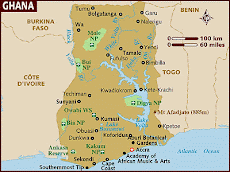We have completed our final headteacher workshop. We have had 65 attendees in total, and we are very pleased with the feedback received. There are certainly some very talented and committed headteachers in the area. Their pay is very low, and teachers pay is even lower. There is a real job to be done by the government in raising the status and self esteem of school staff, if Ghana's millennium goal of universal education for all 5-14 year olds is to be achieved.
.jpg)
.jpg)
Our families have raised significant sums of money for our work and this has been used to provide resources for our workshops. Paper is a really expensive and precious commodity here. It all has to be brought by road from Accra. We have provided headteachers with printed materials that will enable them to share learning with their staff, undertake key self evaluations, and work on developing more appropriate learning and teaching strategies. The workshops have given them much to consider in improving their leadership and management of their schools.
.jpg)
People at home have also collected and sent out computer components. With replacement hard drives we have been able to bring some ‘old’ computers back to life. Education Service staff are slowly plucking up courage to come to the resource centre to practice their typing and mouse control skills.
Using money sent from home, we have also assembled over 100 scissors, rulers, tape measures, marker pens, string, pegs and geometrical instruments. These are all bagged up ready for distribution to all primary and junior sedondary schools in the municipality. This equipment will enable schools to produce classroom displays and a wide range of teaching and learning materials. Here is Haydn bringing the pegs and balls of string from the local market.
.jpg)
School walls are concrete (where there are classrooms!), so display is an issue. With string and pegs, teachers are able to hang up visual displays and resources which make for much more interactive learning. Many thanks to our families for making all this possible and, of course, to our Education Service colleagues, who are seen below, bagging up all the equipment.
.jpg)
.jpg)
One of the local volunteers has been collecting all the cardboard he can get and is cutting it into rectangles, painting the pieces black and encouraging their use as mini chalkboards. This enables students to demonstrte their understanding and therefore helps the teacher to assess their progress. As paper is so expensive, the small chalk boards are an innovative and helpful resource that costs very little to provide.
Our new volunteer colleagues arrived last weekend and are settling in to their new environment. Joanne is now sharing our house with us; Maureen moves in when we go. The house will then be theirs.
.jpg)
Joanne is a teacher support officer - and the first VSO volunteer from Gibralter. She is the one who will eventually distribute all our resource packs to schools. Joanne is working with us, as a direct replacement for Melanie. She is focussed on helping the schools to develop more creative and effective teaching practice. She will be the catalyst to ensure that the packs we have provided will be put to good use. She will work with Education Service staff to give teachers ideas about learning resources that will help stimulate interest and thus aid learning for the students.
Maureen is working at the Regional Education Office on the development of the curriculum for pupils with special needs. To many in Ghana, "special needs" still equates to disability and the concept that some students are slower learners than others, is new. She will have some great challenges ahead.
Short term, there will be another resident at our house. He will actually move in next weekend. Greg is a US engineer from Seattle. Greg is working with the local office of the Ministry of Food and Agriculture (MoFA). The government has bought agricultural equipment and his role is to help local people get the equipment working in the local environment. His key project concerns the combine harvester, mentioned last week. Now we have a photograph of the combine harvester working in a rice field.
.jpg)
.....and a couple of the Combine harvester at the local MoFA headquarters.
.jpg)
.jpg)
Greg has an instruction manual in Chinese, and one of his tasks is to investigate every last cog and screw in the combine harvester and to produce an instruction manual in English.
To get this complex piece of machinery into small rice fields is a real challenge. The government has encouraged farmers to assemble plots of land into blocks, so that the combine can harvest a big area and the farmers can then share the resulting grain. The cost of such machinery is way beyond the reach of farmers and some form of co-operative arrangement has to be worked out. A problem appears to be that the World Bank, and international support agencies for agriculture do not like the sound of co-operatives, generally. They want the machinery owned by private individuals and not by the government. Currently there is no Upper West Region business that can afford the capital involved. The combine is certainly beyond the reach of any individual farmer in the Upper West. Brand new tractors lie idle at the MoFA HQ, because no-one can afford to buy or run them. The way forward has to be farmers sharing equipment costs and any resulting profits.
.jpg)
We end this week with a few early quotes from Maureen and Joanne.
“Its hot ................and it's all goats and gutters”
“Aren’t people friendly!”
“How on earth do you find your way around without road names and maps?"
.jpg)
.jpg)
.jpg)
.jpg)
.jpg)
.jpg)
.jpg)
.jpg)
.jpg)
.jpg)
.jpg)
.jpg)
.jpg)
.jpg)
.jpg)
.jpg)
.jpg)
.jpg)
.jpg)
.jpg)
.jpg)
.jpg)
.jpg)
.jpg)
.jpg)
.jpg)
.jpg)
.jpg)
.jpg)
.jpg)
.jpg)
.jpg)


